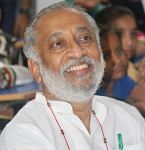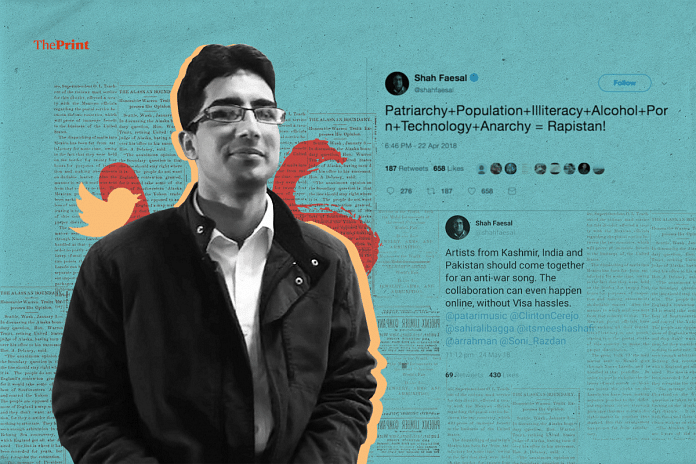A departmental inquiry has been initiated against Kashmir cadre IAS officer Shah Faesal for posting a tweet about rape culture in South Asia. The Department of Personnel and Training found his tweet in violation of the code of conduct for civil servants and has called it “unbecoming.”
Faesal, however, said that he did not trade his freedom for a monthly salary and called the notice an invocation of colonial spirit in democratic India.
ThePrint asks: Should an IAS officer be free to air views on social media or is it unbecoming behaviour?
Calling your country ‘Rapistan’ won’t be accepted even by most liberal dispensation
 Sanjay Dixit
Sanjay Dixit
Additional chief secretary, Rajasthan
We had a very interesting debate once on how the various conduct rules imposed on the civil servants could be saved under the exceptions to Article 19 that placed restrictions on various freedoms. Article 19 (2) relating to freedom of speech and expression has the widest restrictions possible, but freedom of association has very limited restrictions. So how would a code of conduct be saved?
We finally found that the code of conduct is framed under Article 19 (1) (g), relating to professions, and is saved under Article 19 (6), which outlines restrictions placed in the interest of the general public.
It is idle to contend that there should be no service rules, or that social media should be specially monitored in a manner similar to an Orwellian dystopia described in the epic novel 1984. Both are extreme positions that need to be balanced. It is also naïve for an officer to say that he did not mortgage his freedom for a monthly salary. Of course he did – by taking an oath on the Constitution of India under which the All India Services Act is framed. There is nothing special with respect to social media, and the rules expressly provide avenues for literary, scientific, and other forms of expressions.
What they forbid is also expressly provided – one shall neither criticise the government one is working under, nor the union government. One shall not take part in politics, nor shall indulge in unbecoming behaviour.
This last bit about unbecoming behaviour often gives a pass to both the governments and the officers to test the boundaries of the code. The judicial pronouncements have usually tended to keep the boundary on the side of a liberal interpretation, but calling your country ‘rapistan’ will not be countenanced even by the most liberal dispensation. Maryada should be the keyword.
Shah Faesal’s case can hardly be called a transgression
 Nitin Pai
Nitin Pai
Director, The Takshashila Institution
Another way to frame the question would be: What should civil servants be restricted from expressing in public and, related to that, how should civil servants conduct themselves on social media. As Indian citizens, civil servants are free to express their views in public, subject to their specific service conditions.
The public conduct of any civil servant must uphold the values of the Indian republic and promote the spirit and letter of the Constitution. Where a civil servant wants to express an opinion that runs contrary to this, then the proper thing to do is resign from office first. The higher the civil servant’s authority, the more stringent is the need to be consistent with constitutional morality. After all, the words of a home secretary are accorded greater importance than those of a police constable.
Like any corporation, it is fair for the government to ensure that its employees do not conduct themselves in ways that can damage its credibility and public image.
For their part, civil servants must recognise the difference between the three – being a citizen dishing out personal opinions, being a public intellectual dispensing policy gyan, and the job description of a civil servant. An overwhelming number of civil servants do recognise the difference. Many even take it a step too far by refusing to write memoirs long after retirement. The old-fashioned advice that a good civil servant should keep his/her head down, nose out of partisan politics, and person away from the limelight remains a good one.
Shah Faesal’s case can hardly be called a transgression, and it is unreasonable for the government to proceed against him.
We can’t base our observations only on Faesal’s tweet
 Padamvir Singh
Padamvir Singh
Former director, LBSNAA, and former IAS officer
According to the code of conduct for civil servants, there are different kinds of writing. One is the kind of writing that is permitted (like something creative or scientific). The other is the kind of writing for which one needs to take permission.
And then, there are reflections on the political state of the country, and civil servants are asked to refrain from those. Shah Faesal’s equation seems to fall in the first category.
The tweet seems to be just a thought. I would put it in the category of an intellectual exercise of the factors that influence our social atmosphere. In fact, it seems there is nothing in the tweet that reflects the politics of the country.
If the only issue is with the equation that he has put forward, then I don’t know why departmental action has been initiated. There isn’t anything very ‘unbecoming’ in this particular equation. It’s a sociological generalisation, and a sociologist may demolish it. A scientist doesn’t get punished for having a wrong theory.
However, as an independent observer, we don’t know if this tweet is the only premise on which the government has initiated action against Faesal.
We can’t base our observations only on Faesal’s tweet. We must consider the possibility that there is something else that he hasn’t put out in the public domain. If this single tweet is the sole cause, then prima facie there isn’t enough evidence to allege ‘unbecoming’ behaviour.
The government should develop a clear policy on social media. But, it can always say that such a policy is already mentioned in the conduct rules.
By agreeing to become an ‘officer of state’, one agrees to ‘reasonable restraint’
 Dilip Cherian
Dilip Cherian
Communications consultant
Public servants in their capacity as ‘officers of the state’ are bound by service rules. These rules are different today from what they were in colonial times but they fall far short of today’s digital expectations for sure. However, officers in crucial positions (like in home and defence) are bound to be monitored due to security considerations.
Certain aspects of an officer’s private lives could be governed by service rules. As long as the officer is in service, he is obligated to accept these restrictions, which only apply to personal conduct and political expression. In that broad spirit, an officer of state needs to be prudent in his social media expression.
Comparison with a politician’s rights on social media would be erroneous. Politicians are bound by party positions. Individual politicians rarely dare to cross party lines. When they do, they do at considerable risk.
On the face of it, it may seem that monitoring of an official’s personal handle is unconstitutional and violative of the right to the freedom of speech. But it must be emphasised that by agreeing to become an ‘officer of state’, an individual agrees to ‘reasonable restraint’.
The entitlement to free expression is pretty much absolute. The founding fathers believed that as long as you didn’t cause unrest or grave hurt you’re entitled to your opinion. I must emphasise that under ‘reasonable restriction’ our politicians would love to go the whole mile and become a nanny state. This is especially dangerous in today’s context of majoritarianism.
So, monitoring and reprimanding cannot be accepted as an absolute right, but must be seen as exceptional and extraordinary. Surely, there is no expectation that just because a civil servant is in the service of the government, s/he should not be entitled to either his/her opinions or free and unfettered expressions.
The nanny state becomes pretty much the doggy state if it sniffs and ferrets everything that you do. Your social media handles and who you interact with are your own business and yours only. The state has no absolute right to step there.
Faesal’s act of defiance is for bureaucracy what the SC judges’ presser was for judiciary
 Sanya Dhingra
Sanya Dhingra
Reporter, ThePrint
It is needless to say that it is undemocratic of any government to make its employees swear an oath of silence over every wrongdoing that they witness – especially when they are the ones held responsible for so much of it.
It is nobody’s case that those in positions of responsibility and power do not need to exercise restraint in the way they express themselves. Their ability to influence public discourse is one reason. Their ability to actually spur change, rather than simply complaining, is the other. However, does responsibility mean that any word of criticism, any expression of dissent, any suggestion that not everything is hunky-dory must be prohibited – and as in Shah Faesal’s case, be penalised?
The show-cause notice sent to Faesal for simply highlighting the rape culture prevalent in the country raises a question that the great Indian bureaucracy must confront. Why does clearing an exam to enable one to serve the country come with an oath of silence? According to the service rules, which Faesal has rightly called ‘primitive’ in his interview to ThePrint, no member of the service can criticise any policy or action of the central or state government. It is needless to say that it is undemocratic of any government to make its employees swear an oath of silence over every wrongdoing that they witness – especially when they are the ones held responsible for so much of it.
A senior woman bureaucrat in the government had lashed out at Indian women last year for falsely implicating men and misusing almost every law meant for their protection. She never faced the wrath of the government for speaking up or portraying the Indian society in a bad light. Yet, when Faesal shed light on the rape culture in the country, he had transgressed the sacrosanct boundaries of being an obedient bureaucrat.
If there was one thing that the Supreme Court judges’ historic press conference in January taught the country, it was that sometimes speaking up – no matter how unprecedented it may be – is the only option. Faesal’s act of defiance, albeit much smaller in scale, is for the Indian bureaucracy what the press conference by four of the senior-most Supreme Court judges was for the Indian judiciary.
Compiled by Deeksha Bhardwaj, journalist at ThePrint.




Faisal has raised social a social issue which must have been appreciated except one wrong word which he should have avoided. Whereas we have example of Sanjay Dixit whose tweets mostly are full of communal hate against a particular community and religion. A person filled with so much hate can’t do justice to his position as a senior IAS Officer. No action seems to have been taken against him for his hateful tweets.
The highest loyalty of a public servant belongs to public than the govt. If he has spoken about reality prevailing in our country then he has not spoken against govt but against the society. He must be applauded for it.
It’s not wrong if government wants to take action against anyone legally as in this case…
But is not it good if same standards are also followed by the politicians atleast those who are in high positions …
Is not it wrong when politicians made racial or communal comments or fake their achievements
There should be some laws to control politicians behaviour.
Because by now they have already lost their moral authority to punish these officers because they have written or communicated much wrong contents that that of this officer’s.
Mr Faesal has expressed an analytical TRUTH except the word Rapistan what I consider illogical over enthusiasm.But criticism or comments or individual opinions should be taken for its positive ideas for the greater benefit of the society at large.Anyway,ours is a developing nation also psychologically and intellectually.
There is indeed a huge increase in rapes. Porn is the cause and needs to be banned. Why is there an issue in the IAS officer making this statement. He has stated facts.
This matter is related to females and childrens as they are the victim s of rape..So, in this matter opinion should be taken from the entire Indian female population and everything will be clear…
Rape is a heinous crime and has no place in a civilised society. Government and courts are very strict in dealing with rapists. But inspite of best efforts some incident happen but at the same time it is not expected from a responsible government officer to name his country as Rapistan. Indian constitution gives the Right to Speech and Expression but the right is not absolute and is under certain restraints. No body can be allowed to speak whatever he wants. He is bound to have in the parameters. Leave the case of officer who is getting salary from state exchequer even a politician and ordinary citizen is at liberty to give bad name to the country. It would have been better if the officer would have given the suggestions to combat such crimes against humanity.